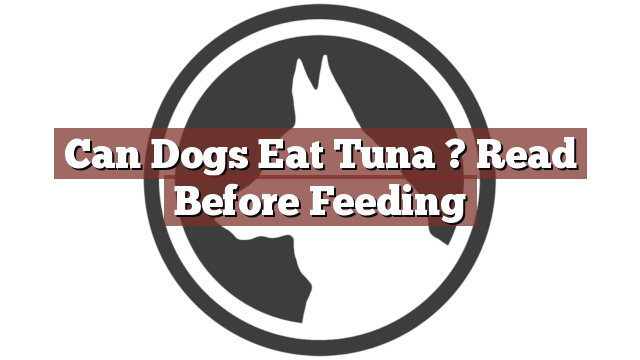Understanding Your Dog’s Dietary Needs
Before deciding whether or not to feed tuna to your dog, it is important to understand their dietary needs. Dogs are carnivorous animals, which means they require a diet that is rich in protein. While they can digest some plant-based foods, their bodies are designed to primarily process animal proteins. It is also crucial to note that dogs have specific nutritional requirements that differ from humans. Therefore, it is vital to provide them with a well-balanced diet that meets their specific needs.
Can Dogs Eat Tuna? Read Before Feeding
Can dogs eat tuna? This is a common question among dog owners who are unsure about what foods are safe for their furry companions. The answer is yes, but with caution. Tuna can be a healthy addition to your dog’s diet when given in moderation. It is a great source of protein, vitamins, and minerals that can help support their overall health. However, there are certain factors to consider before feeding tuna to your dog.
Pros and Cons of Feeding Tuna to Your Dog
While tuna can provide several benefits to your dog’s diet, there are also potential drawbacks to consider. One of the main concerns is the mercury content in tuna. Mercury is a naturally occurring element that can accumulate in the tissues of fish, including tuna. High levels of mercury can be toxic to dogs, leading to various health issues. Therefore, it is essential to choose low-mercury tuna options and limit the frequency of feeding tuna to your dog.
Additionally, tuna can also be high in sodium, especially if it is canned or processed. Excessive sodium intake can cause dehydration and lead to health problems such as kidney issues or heart disease in dogs. Therefore, it is crucial to provide tuna in its natural form, without any added salt or seasoning. It is also advisable to give tuna as an occasional treat rather than a regular part of your dog’s diet.
In Conclusion: Make an Informed Decision for Your Dog’s Health
While dogs can eat tuna, it is important to make an informed decision for the well-being of your furry friend. Before introducing any new food into their diet, consult with your veterinarian to ensure it aligns with their specific dietary needs and any existing health conditions. Remember to choose low-mercury tuna options, provide it in moderation, and avoid any added salt or seasoning. By considering these factors, you can safely incorporate tuna into your dog’s diet and provide them with the necessary nutrients for a healthy and balanced life.
Thank you for taking the time to read through our exploration of [page_title]. As every dog lover knows, our furry friends have unique dietary needs and responses, often varying from one canine to another. This is why it's paramount to approach any changes in their diet with caution and knowledge.
Before introducing any new treats or making alterations to your dog's diet based on our insights, it's crucial to consult with a veterinarian about [page_title]. Their expertise ensures that the choices you make are well-suited to your particular pet's health and well-being.
Even seemingly harmless foods can sometimes lead to allergic reactions or digestive issues, which is why monitoring your dog after introducing any new food item is essential.
The content provided here on [page_title] is crafted with care, thorough research, and a genuine love for dogs. Nevertheless, it serves as a general guideline and should not be considered a substitute for professional veterinary advice.
Always prioritize the expert insights of your veterinarian, and remember that the health and happiness of your furry companion come first.
May your journey with your pet continue to be filled with joy, love, and safe culinary adventures. Happy reading, and even happier snacking for your canine friend!

